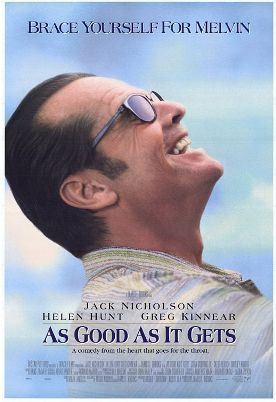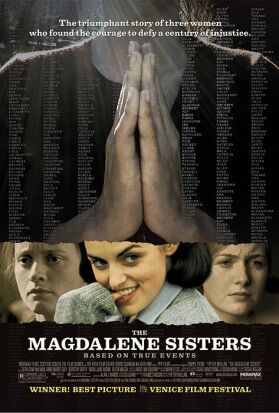As Good As It Gets
The joke that gives As Good As It Gets its title is the best thing in the picture. Melvin Udall (Jack Nicholson), a successful novelist, suffers from obsessive-compulsive disorder which manifests itself in an insane punctiliousness about rituals, not stepping on cracks in the sidewalk, excessive hand-washing and the like. When his routine is disrupted he pays a frantic visit to his psychiatrist, trying to get an instant appointment, which the psychiatrist refuses. In revenge Melvin exits through the shrink’s crowded waiting room and says to the unhappy looking people there, “What if this is as good as it gets?” This is brilliantly naughty and cuts to the quick of our national obsession with psychic hygiene. But most of the naughtiness in the film is very much less brilliant.
Rather like Quentin Tarantino, who has discovered a whole new comic dimension to the word “nigger,” director and co-writer James L. Brooks has milked all the laughs there are to be had from the unenlightened prejudices so helpfully identified for us by the new sensitivity. Melvin, being white, naturally cannot go so far as using the word “nigger,” but he calls blacks “colored” and stereotypes them as violent criminals. He also refers to his gay neighbor, Simon (Greg Kinnear), as a “fudgepacker” and a “fag” and moves a couple Jews from his favorite table in his favorite restaurant by wondering out loud if their appetites are as big as their noses. Most tellingly, perhaps, he utters the ultimate Hollywood blasphemy by insulting feminine moral gravitas. In a scene chosen for the trailer, Melvin answers a female fan of his fiction who wonders how he comes to be so good at representing women by saying: “I think of a man, then I take away reason and accountability.”
This, it is true, seems to get a huge reaction from both men and women whose nervous exhilaration at walking on the edge of the verboten expresses itself in an enormous gust of laughter. There is a kind of subversive joy to be had in the Age of Nice from vicarious participation in such delicious maliciousness, and the film takes advantage of it to produce a steady stream of funny one-liners. Where it is not so successful is in redeeming its horrible nasty central character by love. It’s not that I have anything against redemption by love. Some of the great works of literature—Dante’s Comedia, Goethe’s Faust, and Crime and Punishment come to mind—have to do with redemption by love. But it rather sticks in the craw when the love interest is Simon’s little dog. True, Melvin has a human sweetheart, an improbably gorgeous waitress and single mother called Carol (Helen Hunt), but even she hasn’t got a huge job of redemption to do. The worst thing Melvin does is put the dog down a trash chute. And, of course, the dog is unhurt.
This, by the way, leads to the picture’s second-best joke: a note at the end of the credits that “No actors were harmed in the making of this picture.” But there is a sense of disappointment in the fact that Melvin only turns out to be that familiar figure, the curmudgeon with the heart of gold. Not only does he offer free medical care to Carol, so that her sickly son is enabled to lead a normal life, but he also takes in the gay neighbor when he is beaten up, bankrupt and evicted. All he has left to do is learn the spirit of the song by Eric Idle (sung by Art Garfunkle) that goes “Always Look On the Bright Side of Life” and to learn (ah! shades of the dear departed 1970s) to “feel good about himself.” What an anticlimax after such a promising start! But there are still enough good jokes to keep you laughing if you haven’t anything else to laugh at.
Discover more from James Bowman
Subscribe to get the latest posts to your email.








